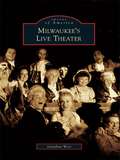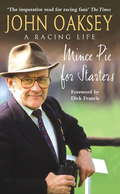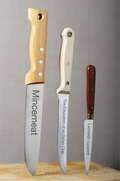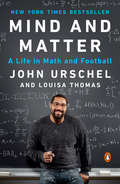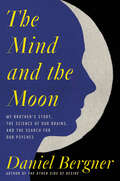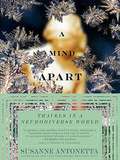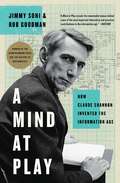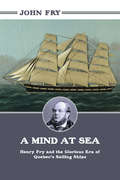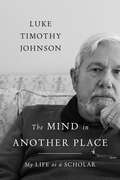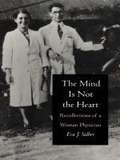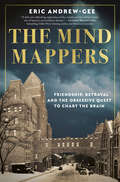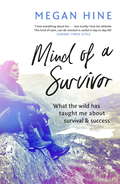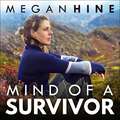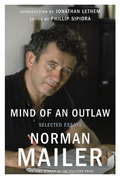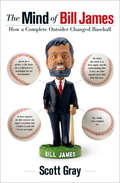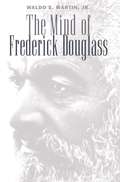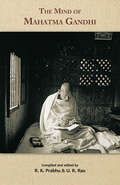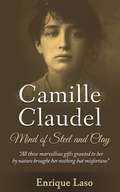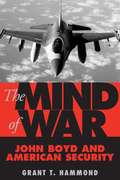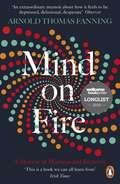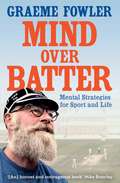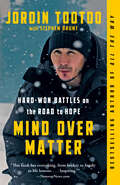- Table View
- List View
Milwaukee's Live Theater (Images of America)
by Jonathan WestMilwaukee's live theater scene is the sum of several exciting parts. For many, Milwaukee live theater means world-class productions done by resident actors at one of the nation's leading regional theaters. For others, it has been defined by the machinations of a respected experimental theater troupe that traveled throughout Europe in the 1980s and was once honored with an Obie Award. There was a time when Milwaukee live theater meant a big top arena where some of the biggest stars of American musical theater frolicked and played for local audiences. Audiences in Milwaukee have enjoyed the classics, new plays, and contemporary hits performed by never-say-die producers who boast personalities larger than the stages their companies play upon. The Milwaukee theater style is not fussy or overblown. It is informed by a thrilling past, buoyant future, unsurpassed community support, and unfailing devotion to solid midwestern work ethics channeled into artistic innovation. Simply put, Milwaukee's live theater scene is the best-kept artistic secret in the United States.
Min by på Sicilien
by Bodil Bergh Cristiano ParafioritiI en serie noveller berättar Cristiano Parafioriti på ett levande sätt om sin uppväxt i en liten by på Sicilien. Ljuden från sparkade fotbollar och grälande kvinnor blandas med doften av mulåsnor och pinjeträd. Alla berättelserna genomsyras av genuin kärlek till familjen, vännerna, hembygden och även till hans katolska tro.
Mince Pie for Starters
by John OakseyJohn Oaksey has seen it all in racing, as a jockey, commentator and newspaper reporter. After a lifetime devoted to the sport he recalls the splendid characters, horses and races that have made horseracing the great passion of his life, a passion that he is so brilliantly able to convey to others. One of the most respected and loved people in the sport, partly due to his work with the Injured Jockeys' Fund, John Oaksey has a fund of fascinating and hilarious stories to tell. This book is not just a wonderful self-portrait, it is also a definitive account of racing since the war.
Mince Pie for Starters
by John OakseyJohn Oaksey has seen it all in racing, as a jockey, commentator and newspaper reporter. After a lifetime devoted to the sport he recalls the splendid characters, horses and races that have made horseracing the great passion of his life, a passion that he is so brilliantly able to convey to others. One of the most respected and loved people in the sport, partly due to his work with the Injured Jockeys' Fund, John Oaksey has a fund of fascinating and hilarious stories to tell. This book is not just a wonderful self-portrait, it is also a definitive account of racing since the war.
Mincemeat: The Education of an Italian Chef
by Danielle Rossi Leonardo Lucarelli Lorena Rossi GoriWith the wit and pace of Anthony Bourdain, Italian chef and anthropologist Leonardo Lucarelli sketches the exhilarating life behind the closed doors of restaurants, and the unlikely work ethics of the kitchen. In Italy, five-star restaurants and celebrity chefs may seem, on the surface, a part of the landscape. In reality, the restaurant industry is as tough, cutthroat, and unforgiving as anywhere else in the world--sometimes even colluding with the shady world of organized crime. The powerful voice of Leonardo Lucarelli takes us through the underbelly of Italy's restaurant world. Lucarelli is a professional chef who for almost two decades has been roaming Italy opening restaurants, training underpaid, sometimes hopelessly incompetent sous-chefs, courting waitresses, working long hours, riding high on drugs, and cursing a culinary passion he inherited as a teenager from his hippie father. In his debut, Mincemeat: The Education of an Italian Chef, Lucarelli teaches us that even among rogues and misfits, there is a moral code in the kitchen that must, above all else, always be upheld.
Mind and Matter: A Life in Math and Football
by Louisa Thomas John UrschelFor John Urschel, what began as an insatiable appetite for puzzles as a child developed into mastery of the elegant systems and rules of mathematics. By the time he was thirteen, Urschel was auditing a college-level calculus course. But when he joined his high school football team, a new interest began to eclipse the thrill he felt in the classroom. Football challenged Urschel in an entirely different way, and he became addicted to the physical contact of the sport. After he accepted a scholarship to play at Penn State, his love of math was rekindled. As a Nittany Lion, he refused to sacrifice one passion for the other. Against the odds, Urschel found a way to manage his double life as a scholar and an athlete. While he was an offensive lineman for the Baltimore Ravens, he simultaneously pursued his PhD in mathematics at MIT. Weaving together two separate narratives, Urschel relives for us the most pivotal moments of his bifurcated life. He explains why, after Penn State was sanctioned for the acts of former coach Jerry Sandusky, he declined offers from prestigious universities and refused to abandon his team. He describes his parents’ different influences and their profound effect on him, and he opens up about the correlation between football and CTE and the risks he took for the game he loves. Equally at home discussing Georg Cantor’s work on infinities and Bill Belichick’s playbook, Urschel reveals how each challenge—whether on the field or in the classroom—has brought him closer to understanding the two different halves of his own life, and how reason and emotion, the mind and the body, are always working together. “So often, people want to divide the world into two,” he observes. “Matter and energy. Wave and particle. Athlete and mathematician. Why can’t something (or someone) be both?”
The Mind and the Moon: My Brother's Story, the Science of Our Brains, and the Search for Our Psyches
by Daniel Bergner“A profound and powerful work of essential reporting." —The New York Times Book ReviewAn important—and intimate—interrogation of how we treat mental illness and how we understand ourselvesIn the early 1960s, JFK declared that science would take us to the moon. He also declared that science would make the “remote reaches of the mind accessible” and cure psychiatric illness with breakthrough medications. We were walking on the moon within the decade. But today, psychiatric cures continue to elude us—as does the mind itself. Why is it that we still don’t understand how the mind works? What is the difference between the mind and the brain? And given all that we still don’t know, how can we make insightful, transformative choices about our psychiatric conditions?When Daniel Bergner’s younger brother was diagnosed as bipolar and put on a locked ward in the 1980s, psychiatry seemed to have achieved what JFK promised: a revolution of chemical solutions to treat mental illness. Yet as Bergner’s brother was deemed a dire risk for suicide and he and his family were told his disorder would be lifelong, he found himself taking heavy doses of medications with devastating side effects.Now, in recounting his brother’s journey alongside the gripping, illuminating stories of Caroline, who is beset by the hallucinations of psychosis, and David, who is overtaken by depression, Bergner examines the evolution of how we treat our psyches. He reveals how the pharmaceutical industry has perpetuated our biological view of the mind and our drug-based assumptions about treatment—despite the shocking price paid by many patients and the problematic evidence of drug efficacy. And he takes us into the pioneering labs of today’s preeminent neuroscientists, sharing their remarkably candid reflections and fascinating new theories of treatment.The Mind and the Moon raises profound questions about how we understand ourselves and the essential human divide between our brains and our minds. This is a book of thought-provoking reframings, delving into the science—and spirit—of our psyches. It is about vulnerability and personal dignity, the terrifying choices confronted by families and patients, and the prospect of alternatives. In The Mind and the Moon, Bergner beautifully explores how to seek a deeper engagement with ourselves and one another—and how to find a better path toward caring for our minds.
A Mind Apart
by Susanne AntonettaThis beautifully written exploration of "the unusual abilities of those who are differently wired" (Psychology Today) received a Ken Book Award from the National Alliance on Mental Illness for outstanding literary contribution to the world of mental health. In this fascinating literary memoir, Susanne Antonetta draws on her personal experience as a manic-depressive, as well as interviews with people with multiple personality disorder, autism, and other neurological conditions, to form an intimate meditation on mental "disease. " She traces the many capabilities-the visual consciousness of an autistic, for example, or the metaphoric consciousness of a manic-depressive-that underlie these and other mental "disabilities. " A stunning portrait of how the world shapes itself in minds that are profoundly different from the norm, A Mind Apart urges readers to look beyond the concept of cures to the gifts inherent in many neuroatypical conditions. Employing a wide-ranging approach to her subject, Antonetta provides a rare glimpse into the wildly varying landscapes of human thought, perception, and emotion. .
A Mind at Play: How Claude Shannon Invented the Information Age
by Jimmy Soni Rob GoodmanWinner of the Neumann Prize for the History of Mathematics "We owe Claude Shannon a lot, and Soni & Goodman&’s book takes a big first step in paying that debt." —San Francisco Review of Books "Soni and Goodman are at their best when they invoke the wonder an idea can instill. They summon the right level of awe while stopping short of hyperbole." —Financial Times "Jimmy Soni and Rob Goodman make a convincing case for their subtitle while reminding us that Shannon never made this claim himself." —The Wall Street Journal &“A charming account of one of the twentieth century&’s most distinguished scientists…Readers will enjoy this portrait of a modern-day Da Vinci.&” —FortuneIn their second collaboration, biographers Jimmy Soni and Rob Goodman present the story of Claude Shannon—one of the foremost intellects of the twentieth century and the architect of the Information Age, whose insights stand behind every computer built, email sent, video streamed, and webpage loaded. Claude Shannon was a groundbreaking polymath, a brilliant tinkerer, and a digital pioneer. He constructed the first wearable computer, outfoxed Vegas casinos, and built juggling robots. He also wrote the seminal text of the digital revolution, which has been called &“the Magna Carta of the Information Age.&” In this elegantly written, exhaustively researched biography, Soni and Goodman reveal Claude Shannon&’s full story for the first time. With unique access to Shannon&’s family and friends, A Mind at Play brings this singular innovator and always playful genius to life.
A Mind at Sea: Henry Fry and the Glorious Era of Quebec's Sailing Ships
by John FryThe trials and tribulations of a Canadian business titan during a fascinating period in 19th-century Quebec. A Mind at Sea is an intimate window into a vanished time when Canada was among the world’s great maritime countries. Between 1856 and 1877, Henry Fry was the Lloyd’s agent for the St. Lawrence River, east of Montreal. The harbour coves below his home in Quebec were crammed with immense rafts of cut wood, the river’s shoreline sprawled with yards where giant square-rigged ships – many owned by Fry – were built. As the president of Canada’s Dominion Board of Trade, Fry was at the epicentre of wealth and influence. His home city of Quebec served as the capital of the province of Canada, while its port was often the scene of raw criminality. He fought vigorously against the kidnapping of sailors and the dangerous practice of deck loading. He also battled against and overcame his personal demon – mental depression – going on to write many ship histories and essays on U.S.-Canada relations. Fry was a colourful figure and a reformer who interacted with the famous figures of the day, including Lord and Lady Dufferin, Sir John A. Macdonald, Wilfrid Laurier, and Sir Narcisse-Fortunat Belleau, Quebec’s lieutenant-governor.
The Mind in Another Place: My Life as a Scholar
by Luke Timothy JohnsonA witness to the peculiar way of being that is the scholar&’s Luke Timothy Johnson is one of the best-known and most influential New Testament scholars of recent decades. In this memoir, he draws on his rich experience to invite readers into the scholar&’s life—its aims, commitments, and habits. In addition to sharing his own story, from childhood to retirement, Johnson reflects on the nature of scholarship more generally, showing how this vocation has changed over the past half-century and where it might be going in the future. He is as candid and unsparing about negative trends in academia as he is hopeful about the possibilities of steadfast, disciplined scholarship. In two closing chapters, he discusses the essential intellectual and moral virtues of scholarly excellence, including curiosity, imagination, courage, discipline, persistence, detachment, and contentment. Johnson&’s robust defense of the scholarly life—portrayed throughout this book as a generative process of discovery and disclosure—will inspire both new and seasoned scholars, as well as anyone who reads and values good scholarship. But The Mind in Another Place ultimately resonates beyond the walls of the academy and speaks to matters more universally human: the love of knowledge and the lifelong pursuit of truth.
The Mind is Not the Heart: Recollections of a Woman Physician
by Eva J. SalberAvailable for the first time in paperback, Eva Salber's The Mind Is Not the Heart (originally published in 1989), is the personal and political story of a white, Jewish, South African woman who practiced medicine for over fifty years among the impoverished--both rural and urban, black and white, in South Africa and later in the United States. Her lifelong dedication to providing health care to poor people was informed by a passionate vision of the link between social problems and medicine, accompanied by an embracing involvement with the communities in which she served. In this warm clear-eyed account, Dr. Salber presents not only her own personal journey, that of a professional woman, teacher, wife, and mother, but also the story of the people on the margins of society among whom she worked.
The Mind Mappers: Friendship, Betrayal and the Obsessive Quest to Chart the Brain
by Eric Andrew-GeeThe riveting true story of the star-crossed friendship between two neuroscientists—one famous, the other forgotten—who mapped the brain, but lost each other.In the early 1920s, when neurosurgery was more likely to be a death sentence than a cure, two men revolutionized the study of the brain: Wilder Penfield and William Cone. Drawn together by their shared fascination with the &“undiscovered country&” inside our heads, the surgeons formed a partnership and within ten years established the Montreal Neurological Institute in a Gothic stone hospital on the slope of a mountain. The Neuro soon became the world&’s leading centre for neurological study, attracting men and women from across the globe to a booming mid-century city.But their success came at the cost of their friendship.While Cone spent long hours at patients&’ bedsides and in the blood-spattered operating room, Penfield pursued the loftier goal of discovering the seat of consciousness. The Chief, as he was known, went on to develop the Montreal procedure for treating epilepsy, which helped identify the source of speech, executive function and memory in narrow slivers of grey matter—achievements that illuminated the relationship between mind and body, made possible by Cone&’s anonymous work behind the scenes. Over time, their relationship became fraught with personal and professional hurts—and suddenly ended when Cone was found dead in his office at the age of sixty-two.In this compelling dual biography, Globe and Mail journalist Eric Andrew-Gee weaves together the rich history of The Neuro with that of Penfield and Cone to reveal the untold story of one of the birthplaces of neuroscience. In doing so, he breathes new life into a familiar hero and revives the tragic, forgotten story of his partner, writing Dr. William Cone back into the historical record at last.
Mind of a Survivor: What the wild has taught me about survival and success
by Megan Hine***Shortlisted for the Great Outdoors Book of the Year***Surviving in the wild takes a great deal of strength. Often faced with frozen tundra, sweltering deserts, humid jungles, perilous mountains and fast-flowing rivers, Megan Hine is no stranger to perilous conditions. Whilst leading expeditions and bushcraft survival courses and in her work on television shows such as Bear Gryll's Mission Survive and Running Wild, she has explored the corners of the globe in pursuit of adventure.Faced with the toughest of conditions: bad weather; lack of food and being in the presence of predators, is the ultimate test of character and often the biggest challenge to overcome is in the head. In these situations, the human brain is simultaneously the greatest asset and biggest liability. Not everyone is suited to the great outdoors and when danger calls many aren't as well-equipped to survive, no amount of top of the range kit will save you if you don't have the right frame of mind. Here Megan Hine examines the human ability and instinct for survival, showing us how others have developed the attitudes and attributes to thrive in the most dangerous situations, and how those same attitudes and attributes help them confront problems and obstacles at work and at home. Being chased through the jungle by armed opium farm guards, abseiling past bears and lighting fires with tampons, Megan has seen and done it all. In Mind of a Survivor she takes you along for a series of life-and-death adventures and shows you what happens to people when they are pushed to their limits. Inspirational rather than instructional, Megan examines the human ability and instinct for survival sharing the life tools that she uses and showing how they can as easily be applied to more domestic everyday life - from careers to relationships, from overcoming adversity to decision making. Filled with her own experiences, Mind of a Survivor is packed full of adventure and can help people survive in any situation and cope with whatever life throws at them.
Mind of a Survivor: What the wild has taught me about survival and success
by Megan Hine***Shortlisted for the Great Outdoors Book of the Year***Surviving in the wild takes a great deal of strength. Often faced with frozen tundra, sweltering deserts, humid jungles, perilous mountains and fast-flowing rivers, Megan Hine is no stranger to perilous conditions. Whilst leading expeditions and bushcraft survival courses and in her work on television shows such as Bear Gryll's Mission Survive and Running Wild, she has explored the corners of the globe in pursuit of adventure.Faced with the toughest of conditions: bad weather; lack of food and being in the presence of predators, is the ultimate test of character and often the biggest challenge to overcome is in the head. In these situations, the human brain is simultaneously the greatest asset and biggest liability. Not everyone is suited to the great outdoors and when danger calls many aren't as well-equipped to survive, no amount of top of the range kit will save you if you don't have the right frame of mind. Here Megan Hine examines the human ability and instinct for survival, showing us how others have developed the attitudes and attributes to thrive in the most dangerous situations, and how those same attitudes and attributes help them confront problems and obstacles at work and at home. Being chased through the jungle by armed opium farm guards, abseiling past bears and lighting fires with tampons, Megan has seen and done it all. In Mind of a Survivor she takes you along for a series of life-and-death adventures and shows you what happens to people when they are pushed to their limits. Inspirational rather than instructional, Megan examines the human ability and instinct for survival sharing the life tools that she uses and showing how they can as easily be applied to more domestic everyday life - from careers to relationships, from overcoming adversity to decision making. Filled with her own experiences, Mind of a Survivor is packed full of adventure and can help people survive in any situation and cope with whatever life throws at them.
Mind of an Outlaw
by Jonathan Lethem Phillip Sipiora Norman MailerNorman Mailer was one of the towering figures of twentieth-century American letters and an acknowledged master of the essay. Mind of an Outlaw, the first posthumous publication from this outsize literary icon, collects Mailer's most important and representative work in the form that many rank as his most electrifying. As America's foremost public intellectual, Norman Mailer was a ubiquitous presence in our national life--on the airwaves and in print--for more than sixty years. With his supple mind and pugnacious persona, he engaged society more than any other writer of his generation. The trademark Mailer swagger is much in evidence in these pages as he holds forth on culture, ideology, politics, sex, gender, and celebrity, among other topics. Here is Mailer on boxing, Mailer on Hemingway, Mailer on Marilyn Monroe, and, of course, Mailer on Mailer--the one subject that served as the beating heart of all of his nonfiction. From his early essay "A Credo for the Living," published in 1948, when the author was twenty-five, to his final writings in the year before his death, Mailer wrestled with the big themes of his times. He was one of the most astute cultural commentators of the postwar era, a swashbuckling intellectual provocateur who never pulled a punch and was rarely anything less than interesting. Mind of an Outlaw spans the full arc of Mailer's evolution as a writer, including such essential pieces as his acclaimed 1957 meditation on hipsters, "The White Negro"; multiple selections from his seminal collection Advertisements for Myself; and a never-before-published essay on Sigmund Freud. Incendiary, erudite, and unrepentantly outrageous, Norman Mailer was a dominating force on the battlefield of ideas. Featuring an incisive Introduction by Jonathan Lethem, Mind of an Outlaw forms a fascinating portrait of Mailer's intellectual development across the span of his career as well as the preoccupations of a nation in the last half of the American century.
The Mind of Bill James
by Scott GrayThe first book to chronicle the life and ideas of “the serious baseball fan’s high priest” (New York Times), the impact of his brilliant and entertaining writings, and how someone who never pitched a ball, held a bat, or managed a team fundamentally changed the way baseball is interpreted, analyzed, and even played. Bill James has been called “baseball’s shrewdest analyst” (Slate) and “part of baseball legend” (The New Yorker), and hisBaseball Abstracthas been acclaimed as the “holy book of baseball” (Chicago Tribune). Thirty years ago, James introduced a new approach to evaluating players and strategies, and now his theories have become indispensable tools for agents, statistics analysts, maverick general managers, and anyone who is serious about understanding the game. James began writing about baseball while working at a factory in his native Kansas. In lively, often acerbic prose, he used statistics to challenge entrenched beliefs and uncover surprising truths about the game. His annualBaseball Abstractcaptured the attention of fans and front offices and went on to become a bestselling staple of the baseball book category. In 2002, the Boston Red Sox hired James as an advisor. Two years later they achieved their long-awaited World Series triumph. The Mind of Bill Jamestells the story of how a gifted outsider inspired a new understanding of baseball. It delves deeply into James’s essential wisdom–including his surprising beliefs about pitch counts and the importance of batting-order, thoughts on professionalism and psychology, and why teams tend to develop the characteristics that are least favored by their home parks. It also brings together his best writing, much of it long out of print, as well as insights from new interviews. Written with James’ full cooperation, it is at once an eye-opening portrait of baseball’s virtuoso analyst and a treasury of his idiosyncratic genius.
The Mind of Frederick Douglass
by Waldo E. MartinFrederick Douglass was unquestionably the foremost black American of the nineteenth century. The extraordinary life of this former slave turned abolitionist orator, newspaper editor, social reformer, race leader, and Republican party advocate has inspired many biographies over the years. This, however, is the first full-scale study of the origins, contours, development, and significance of Douglass's thought.Brilliant and to a large degree self-taught, Douglass personified intellectual activism; he possessed a sincere concern for the uses and consequences of ideas. Both his people's struggle for liberation and his individual experiences, which he envisioned as symbolizing that struggle, provided the basis and structure for his intellectual maturation. As a representative American, he internalized and, thus, reflected major currents in the contemporary American mind. As a representative Afro-American, he revealed in his thinking the deep-seated influence of race on Euro-American, Afro-American, or, broadly conceived, American consciousness. He sought to resolve in his thinking the dynamic tension between his identities as a black and as an American.Martin assesses not only how Douglass dealt with this enduring conflict, but also the extent of his success. An inveterate belief in a universal and egalitarian humanism unified Douglass's thought. This grand organizing principle reflected his intellectual roots in the three major traditions of mid-nineteenth-century American thought: Protestant Christianity, the Enlightenment, and romanticism. Together, these influences buttressed his characteristic optimism. Although nineteenth-century Afro-American intellectual history derived its central premises and outlook from concurrent American intellectual history, it offered a searching critique of the latter and its ramifications. How to square America's rhetoric of freedom, equality, and justice with the reality of slavery and racial prejudice was the difficulty that confronted such Afro-American thinkers as Douglass.
The Mind of Mahatma Gandhi
by M. K. GandhiOnly now and again does there arise above the common level some rare spirit, who, having thought about God more deeply, reflects more clearly the divine purpose and puts into practice more courageously the divine guidance. The light of such shines like a strong beacon on a dark and disordered world. Gandhi belongs to the race of the prophets who have the courage of the heart, the courtesy of the spirit and the laughter of the unafraid. Through his life and teaching, he bears testimony to the values for which this country has stood for ages, faith in spirit, respect for its mysteries, the beauty of holiness, the acceptance of life’s obligations, the validity of character, values which are neither national nor international, but universal. … There is so much misunderstanding today about Gandhi’s views and ways of thinking. This book, where we find collected together the relevant extracts from Gandhi’s own writings on the central principles of his faith and conduct, will help to make Gandhi’s position clearer to the modern mind. [From Foreword, 1945] S. Radhakrishnan
The Mind of St. Paul
by William BarclayFrom the Preface: These chapters originally appeared as a series of weekly articles in the pages of The British Weekly. ... To the original series I have added two chapters, one on Sin and the other on the Church in the thinking of Paul. These chapters do not in any way claim to be an exhaustive and complete Theology of Paul. I have simply gone direct to the Pauline letters to find out what Paul said and thought on certain great subjects. Their aim will be fulfilled, if they send people back to the reading of Paul's letters themselves. This is a well-documented presentation of Paul's ideas. It is easy to read and quite interesting.
Mind Of Steel And Clay: Camille Claudel
by Enrique Laso Emma May PriceMind of Steel and Clay: Camille Claudel is a diary. Through the guilt-ridden words of Edouard Faret, Director of the psychiatric hospital of Montdevergues, we are drawn into to the life of an exceptional woman, Camille Claudel.In the 19th century, Camille was an unrivalled sculptress and both the student and lover of Auguste Rodin. She wanted to make a name for herself in a world of men, to achieve the fame and prestige that her work deserved, but this never came to pass.In 1913, after the death of her adored father, her family committed her by force to an asylum. There she would stay, locked up against her will for 30 years until her death, despite the doctors and others who argued in defence of her sanity.Mind of Steel and Clay: Camille Claudel tells the tragic tale of an extraordinary woman, an artistic genius whose fate was sealed with misfortune.For the first time ever, the dark, unknown years of Camille's confinement, an era shrouded in mystery, are revealed and explored in great depth.Through his diary, the Medical Director of the psychiatric hospital describes the years of confinement of the sculptress Camille Claudel. This bloody, ruthless account is teamed with the hardship of the Vichy France regime in World War II, yet is dappled with moments of inspiring hope; art, passion, guilt, madness and genius are at the forefront of this short novel.Perhaps Enrique Laso's most acclaimed and profound novel to date, the author's admiration for Camille shines through, whilst on countless occasions he shares in her rage against the injustice of a world in which the cruel and deplorable are allowed to win.
The Mind of War: John Boyd and American Security
by Grant HammondThe ideas of US Air Force Colonel John Boyd have transformed American military policy and practice. A first-rate fighter pilot and a self-taught scholar, he wrote the first manual on jet aerial combat; spearheaded the design of both of the Air Force's premier fighters, the F-15 and the F-16; and shaped the tactics that saved lives during the Vietnam War and the strategies that won the Gulf War. Many of America's best-known military and political leaders consulted Boyd on matters of technology, strategy, and theory.In The Mind of War, Grant T. Hammond offers the first complete portrait of John Boyd, his groundbreaking ideas, and his enduring legacy. Based on extensive interviews with Boyd and those who knew him as well as on a close analysis of Boyd's briefings, this intellectual biography brings the work of an extraordinary thinker to a broader public.From the Trade Paperback edition.
Mind on Fire: Shortlisted for the Wellcome Book Prize 2019
by Arnold Thomas FanningShortlisted for the Wellcome Book Prize 2019'[A] painfully intense, courageous and gripping account of [Fanning's] journey to the underworld of madness and back. This is a brave and instructive book.' Irish Times'Extraordinary. An account of mental illness, grief, delusions, homelessness, a fractured family relationship ... and all while trying to recover and create. Superb writing on a frequently difficult subject.' Sinéad Gleeson Arnold Thomas Fanning had his first experience of depression during adolescence, following the death of his mother. Some ten years later, an up-and-coming playwright, he was overcome by mania and delusions. Thus began a terrible period in which he was often suicidal, increasingly disconnected from family and friends, sometimes in trouble with the law, and homeless in London.Drawing on his own memories, the recollections of people who knew him when he was at his worst, and medical and police records, Arnold Thomas Fanning has produced a beautifully written, devastatingly intense account of madness - and recovery, to the point where he has not had any serious illness for over a decade and has become an acclaimed playwright. Fanning conveys the consciousness of a person living with mania, psychosis and severe depression with a startling precision and intimacy. Mind on Fire is the gripping, sometimes harrowing, and ultimately uplifting testament of a person who has visited hellish regions of the mind.'Arnold Thomas Fanning offers the most vivid and unflinching window into the mind of someone who is in the throes of madness ... It was like nothing I'd read before' Rick Edwards'Mind on Fire is a truly powerful, arresting, haunting account. Arnold Thomas Fanning has reckoned with the darkest matter of his heart and mind, and I challenge anyone not to be moved by that.' Sara Baume, author of Spill Simmer Falter Wither and A Line Made by Walking'In this strange and singular book, Arnold Thomas Fanning mercilessly excavates the infernal underworld of his own years of madness. As reminiscent as it occasionally is of John Healy's The Grass Arena, and even of Orwell's Down and Out in Paris and London, the book is ultimately not quite like anything else I've read, and brought me as close to the lived reality of mental illness as I have ever been. It's a significant achievement: a painful, inexorable work of autobiography, whose existence is its own form of redemption.' Mark O'Connell, Baillie Gifford Prize-shortlisted author of To Be a Machine'This is an extraordinary memoir about how it feels to be depressed, delusional, desperate' The Observer 'Incredibly important' Emilie Pine, author of Notes to Self'A ratcheting pace, a tight first-person immediacy, and utterly staggering to be a passenger over its entire warped course ... An indelible, ground-shaking account' Hilary A White, Irish Independent, Memoir of the Year, Best Reads of 2018'A spellbinding memoir that should prove both moving and hopefully cathartic for the reader.' RTE Culture 'Told in tight and immediate first-person, and imbued with a startling momentum that ratchets unnervingly, Fanning's publishing debut ... is a significant achievement and should be a talking point in publishing this year.' Irish Independent 'Fanning's debut book lays it on the line in a deeply personal and compelling chronicle of his descent into depression and his way back out.' RTE Guide'Wonderful' Joseph O'Connor, Irish Times Books of the Year'Unsparingly direct, searing and honest ... It is gripping to read and must have been exhausting to live' Medical Independent 'One of the most gripping and revealing memoirs I've read in a long time. A controlled and artful exploration of absolute loss of control, an uns
Mind Over Batter
by Graeme FowlerFollowing the critical and commercial success of Absolutely Foxed, Graeme Fowler returns with a stunning new book that takes the reader inside the mental side of cricket. Few sports can be played as much in the mind as cricket. When bowlers are hurling the ball down at your head at 90 mph, or fielders are crowded round the bat waiting to snap up an edge, only the most resilient can thrive. In Mind Over Batter, former Test batsman, commentator and coach Fowler looks into all facets of the game to assess the mental aspect of cricket. What is mental strength? And how can you improve it, or why do some people suddenly lose it? Can the environment in a dressing room have any impact on both mental strength and mental health? When a game builds up to a dramatic climax - how do you train yourself to cope? Can pressure really lead to catastrophic decision-making and even lead players to bend the rules? Told with his familiar mix of brilliant insight, hilarious anecdotes and moving personal experience of his own mental demons, Fowler delivers a superb portrait of the game. Mind Over Batter will not only shed light on the top echelons of cricket, but it will also provide the reader with many useful ideas on how they can improve their own game and performance - in cricket or in other walks of life. Finally, having resisted for many years despite his own mental health issues, Fowler decides to take a closer look inside his own mind and for the first time undergoes therapy to see if he can work out what makes him tick. What he discovered surprised even him.
Mind Over Matter: Hard-Won Battles on the Road to Hope
by Jordin Tootoo Stephen BruntFollowing the bestselling success of the inspiring All the Way, pioneering Inuit NHLer Jordin Tootoo begins the process of healing in the wake of the suicide and violence that marks his family, only to discover the source of all that trauma in his father's secret past.For some hockey players, retirement marks the moment when it&’s all over. But Jordin Tootoo is not most hockey players.Having inspired millions when he first broke into the league, Tootoo continued to influence people throughout his career—not only through his very public triumph over alcoholism, but also his natural charisma. And now, years after hanging up his skates, he is more committed to doing things the right way and speaking about it to others, whether it&’s corporate executives or Indigenous youth.But the news of unmarked graves on the grounds of residential schools brought back to life many of the demons that had haunted his family. In a moment of realization that left him rattled and saddened, Tootoo fit the pieces together. The years that were never spoken of. The heavy drinking. The all too predictable violence. His father was a survivor, marked by what he had survived.As he travels back to Nunavut to try to speak with his father about what haunts him, he encounters the ghosts of the entire community. Still, as Tootoo says, we are continuously learning and rewriting our story at every step. He has learned from his mistakes and his victories. He has learned from examples of great courage and humility. He has learned from being a father and a husband. And he has learned from his own Inuk traditions, of perseverance and discipline in the face of hardship.Weaving together life&’s biggest themes with observations and experiences, Jordin shares the kind of wisdom he has had to specialize in—the hard-won kind.
